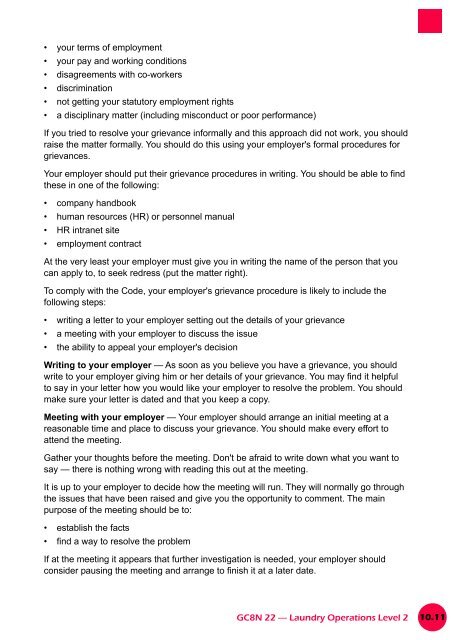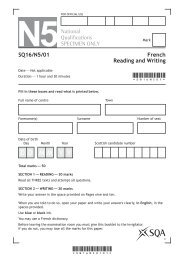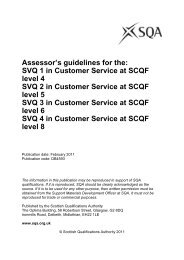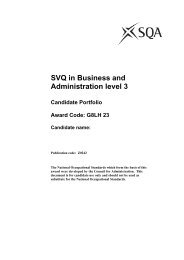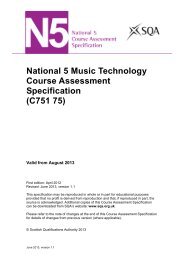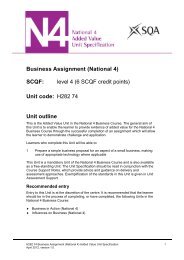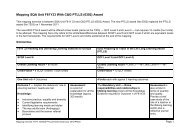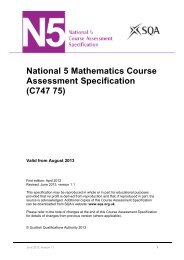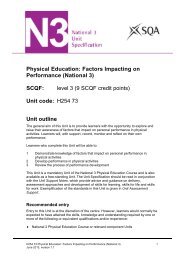- Page 1 and 2:
Candidate Support Pack LAUNDRY OPER
- Page 3 and 4:
Contents Section 1: Introduction Se
- Page 5 and 6:
Section 10: Maintain effective work
- Page 7 and 8:
Laundry Operations Level 2 GC8N 22
- Page 9 and 10:
Introduction About this pack Welcom
- Page 11 and 12:
Laundry Operations Level 2 GC8N 22
- Page 13 and 14:
Contents Introduction About this Un
- Page 15 and 16:
Control of Substances Hazardous to
- Page 17 and 18:
Introduction About this Unit This U
- Page 19 and 20:
About this learning and teaching pa
- Page 21 and 22:
Fire Introduction On average, the B
- Page 23 and 24:
Safe on high voltages Dry powder Mu
- Page 25 and 26:
Fire drill procedures When the fire
- Page 27 and 28:
Accidents and emergencies Introduct
- Page 29 and 30:
If there are any special pieces of
- Page 31 and 32:
Hazards in the workplace Sharp thin
- Page 33 and 34:
Other hazards in the laundry plant
- Page 35 and 36:
In laundries that use compressed ai
- Page 37 and 38:
For example, mixing hydrogen peroxi
- Page 39 and 40:
Activity 11 Which of the following
- Page 41 and 42:
Self-check questionnaire 1 2 3 4 5
- Page 43 and 44:
Electricity and machine safety Intr
- Page 45 and 46:
Activity 14 Choose a machine that y
- Page 47 and 48:
Tumble dryer death at Warrender pla
- Page 49 and 50:
The maintenance of machinery and eq
- Page 51 and 52:
Control of Substances Hazardous to
- Page 53 and 54:
Products that have been assessed as
- Page 55 and 56:
Chemical spillage Spillages or leak
- Page 57 and 58:
Self-check questionnaire 1 2 3 4 5
- Page 59 and 60:
Security Introduction Security in t
- Page 61 and 62:
Operating machinery and equipment N
- Page 63 and 64:
Self-check questionnaire 1 2 3 4 5
- Page 65 and 66:
End of Unit activity Major incident
- Page 67 and 68:
Activity answer sheets: Fire Activi
- Page 69 and 70:
Activity 3 Please ask your trainer
- Page 71 and 72:
Self-check questionnaire 1 2 3 4 5
- Page 73 and 74:
Activity answer sheets: Accidents a
- Page 75 and 76:
Activity answer sheets: Other hazar
- Page 77 and 78:
Activity 11 Which of the following
- Page 79 and 80:
Activity 13 What protective clothin
- Page 81 and 82:
Activity answer sheets: Electricity
- Page 83 and 84:
Self-check questionnaire 1 2 3 4 5
- Page 85 and 86:
Activity answer sheets: Control of
- Page 87 and 88:
Self-check questionnaire 1 2 3 4 5
- Page 89 and 90:
Activity answer sheets: Security Se
- Page 91 and 92:
Laundry Operations Level 2 GC8N 22
- Page 93 and 94:
Contents Introduction About this Un
- Page 95 and 96:
Introduction About this Unit This U
- Page 97 and 98:
Sorting domestic, personal and spec
- Page 99 and 100:
Incorrect lifting of laundry bag by
- Page 101 and 102:
Activity 2 1 You see smoke coming f
- Page 103 and 104:
Activity 4 Detail below the marking
- Page 105 and 106:
Disinfection of infected linen in t
- Page 107 and 108:
As with all systems, it is not with
- Page 109 and 110:
Symbol 40 40 40 Symbol WASHING Brie
- Page 111 and 112:
Activity 9 A pastel blue and white
- Page 113 and 114:
Sorting contract laundry Introducti
- Page 115 and 116:
Setting up the workstation The sort
- Page 117 and 118:
Sorting tables should be used when
- Page 119 and 120:
Classification Introduction Life wo
- Page 121 and 122:
The classification of domestic and
- Page 123 and 124:
Soiling type The influence of soili
- Page 125 and 126:
Activity 21 Answer sheets p. 3.51 1
- Page 127 and 128:
Activity answer sheets: Sorting dom
- Page 129 and 130:
Activity 3 Answer the following que
- Page 131 and 132:
Activity 6 Question p. 3.11 You are
- Page 133 and 134:
Self-check questionnaire 1 What typ
- Page 135 and 136:
Activity answer sheets: Sorting con
- Page 137 and 138:
Activity 12 Why do you think it is
- Page 139 and 140:
Self-check questionnaire 1 Document
- Page 141 and 142:
Activity answer sheets: Classificat
- Page 143 and 144:
Activity 19 Cotton pillowcases are
- Page 145 and 146:
Activity 21 Question p. 3.31 1 Some
- Page 147 and 148:
Notes GC8N 22 — Laundry Operation
- Page 149 and 150:
Laundry Operations Level 2 GC8N 22
- Page 151 and 152:
Contents Introduction About this Un
- Page 153 and 154:
Introduction About this Unit This U
- Page 155 and 156:
Retail packing and dispatch Introdu
- Page 157 and 158:
Folding In the modern laundry there
- Page 159 and 160:
Pillow slips, kitchen cloths and ot
- Page 161 and 162:
The following is the way in which t
- Page 163 and 164:
Once you have checked the buttons/z
- Page 165 and 166:
Packaging Laundries use many differ
- Page 167 and 168:
Bulk packing and dispatch Introduct
- Page 169 and 170:
Packing Laundries are increasingly
- Page 171 and 172:
Activity answer sheets: Retail pack
- Page 173 and 174:
Self-check questionnaire 1 What doe
- Page 175 and 176:
Activity answer sheets: Bulk packin
- Page 177 and 178:
Self-check questionnaire 1 What wei
- Page 179 and 180:
Notes GC8N 22 — Laundry Operation
- Page 181 and 182:
Laundry Operations Level 2 GC8N 22
- Page 183 and 184:
Contents Introduction About these U
- Page 185 and 186:
Operation of a continuous tunnel wa
- Page 187 and 188:
Introduction About these Units The
- Page 189 and 190:
Regulations, rules and guidelines Y
- Page 191 and 192:
• Checking there is sufficient wa
- Page 193 and 194:
• How to plan work, making the be
- Page 195 and 196:
Health and safety and maintenance p
- Page 197 and 198:
Interruptions to water supply are u
- Page 199 and 200:
A high dip on a wash will result in
- Page 201 and 202:
Self-check questionnaire 1 What do
- Page 203 and 204:
The ingredients for a successful wa
- Page 205 and 206:
Activity 6 1 Find out what your lau
- Page 207 and 208:
The ideal wash action will also be
- Page 209 and 210:
Activity 8 1 Detail the types and n
- Page 211 and 212:
The diagram below shows a droplet o
- Page 213 and 214:
Enzymes Enzymes are very complex or
- Page 215 and 216:
Activity 9 Activity 9 1 List the na
- Page 217 and 218:
The wash process Introduction You n
- Page 219 and 220:
Activity 10 If you were to use hydr
- Page 221 and 222:
If your machine has a PLC (Programm
- Page 223 and 224:
Routine maintenance However, some o
- Page 225 and 226:
Activity 11 Using the information y
- Page 227 and 228:
Self-check questionnaire 1 Explain
- Page 229 and 230:
The continuous tunnel washer (CTW)
- Page 231 and 232:
How a continuous tunnel washer work
- Page 233 and 234:
Hardness Water hardness is the amou
- Page 235 and 236:
71 ºC Minimum thermal disinfecting
- Page 237 and 238:
Level of water This is usually refe
- Page 239 and 240:
Activity 16 Select a CTW in your wa
- Page 241 and 242:
As virtually all soiling is either
- Page 243 and 244:
Soap Soap is still added to some fu
- Page 245 and 246:
Sodium hypochlorite is normally sol
- Page 247 and 248:
Activity 20 What bleach do you use
- Page 249 and 250:
Main wash zone This area is where t
- Page 251 and 252:
Activity 22 Answer sheets p. 5.111
- Page 253 and 254:
Due to the problems of manual handl
- Page 255 and 256:
For polyester and polyester cotton
- Page 257 and 258:
If a bag gets stuck, and is not qui
- Page 259 and 260:
Activity 24 Having identified the p
- Page 261 and 262:
Activity 26 Look at the illustratio
- Page 263 and 264:
Compressed air supply If you are us
- Page 265 and 266:
on wash quality such as detergent,
- Page 267 and 268:
Activity 27 Find out what the steam
- Page 269 and 270:
Process of a continuous tunnel wash
- Page 271 and 272:
The weighing device therefore needs
- Page 273 and 274:
Troubleshooting Introduction Despit
- Page 275 and 276:
• Temperature of peroxide/perbora
- Page 277 and 278:
Activity answer sheets: Health and
- Page 279 and 280:
Activity 5 Question p. 5.14 1 What
- Page 281 and 282:
Self-check questionnaire (continued
- Page 283 and 284:
Activity answer sheets: The ingredi
- Page 285 and 286:
Activity 9 Product name Hazard warn
- Page 287 and 288:
Self-check questionnaire (continued
- Page 289 and 290:
Activity answer sheets: The wash pr
- Page 291 and 292:
Self-check questionnaire Use this s
- Page 293 and 294:
Activity answer sheets: The continu
- Page 295 and 296:
Activity 17 Question p. 5.58 List t
- Page 297 and 298:
Activity 22 Question p. 5.65 Follow
- Page 299 and 300:
Activity 25 How do you programme yo
- Page 301 and 302:
Activity 30 What are the safety fea
- Page 303 and 304:
Self-check questionnaire (continued
- Page 305 and 306:
Activity answer sheets: Troubleshoo
- Page 307 and 308:
Laundry Operations Level 2 GC8N 22
- Page 309 and 310:
Contents Introduction About this Un
- Page 311 and 312:
Introduction About this Unit This U
- Page 313 and 314:
Tumble-dry items Introduction The p
- Page 315 and 316:
A standard steam heated tumbler Hea
- Page 317 and 318:
Switches, dials or levers will be a
- Page 319 and 320:
Air drawn from outside the building
- Page 321 and 322:
Choice of drying process The choice
- Page 323 and 324:
If you are given an item made from
- Page 325 and 326:
Self-check questionnaire 1 What are
- Page 327 and 328:
Activity answer sheets: Tumble-dry
- Page 329 and 330:
Activity 5 1 Write a list of six it
- Page 331 and 332:
Self-check questionnaire 1 What are
- Page 333 and 334:
Notes GC8N 22 — Laundry Operation
- Page 335 and 336:
Laundry Operations Level 2 GC8N 22
- Page 337 and 338:
Contents Introduction About these U
- Page 339 and 340:
Introduction About these Units The
- Page 341 and 342:
Key areas of knowledge and understa
- Page 343 and 344:
Health and safety and maintenance p
- Page 345 and 346:
Activity 2 Answer sheets p. 7.27 Li
- Page 347 and 348:
Common mechanical faults Presses ca
- Page 349 and 350:
Types of steam, types of press and
- Page 351 and 352:
Single head press with twin rotatin
- Page 353 and 354:
Triple bucks press In this press, t
- Page 355 and 356:
Folding Once items have been presse
- Page 357 and 358:
Finishing heat sensitive fabrics In
- Page 359 and 360:
Labelling for recommended ironing t
- Page 361 and 362:
Press clothing Introduction Finishe
- Page 363 and 364:
Traditional press clothing — in t
- Page 365 and 366:
Activity answer sheets: Health and
- Page 367 and 368:
Activity answer sheets: Types of st
- Page 369 and 370:
Self-check questionnaire 1 Explain
- Page 371 and 372:
Activity answer sheets: Finishing h
- Page 373 and 374:
Activity answer sheets: Press cloth
- Page 375 and 376:
Laundry Operations Level 2 GC8N 22
- Page 377 and 378:
Contents Introduction About this Un
- Page 379 and 380:
Introduction About this Unit This U
- Page 381 and 382:
About this learning and teaching pa
- Page 383 and 384:
Process flat work through calenders
- Page 385 and 386:
Dangling jewellery, such as bracele
- Page 387 and 388:
Typical vacuum exhaust from clothed
- Page 389 and 390:
Coil spring screwed into roll struc
- Page 391 and 392:
A gauge (ammeter) showing the amoun
- Page 393 and 394:
Activity 3 Answer sheets p. 8.26 Wh
- Page 395 and 396:
Activity 5 Answer sheets p. 8.27 Wh
- Page 397 and 398:
Hand feeder If hand feeding is used
- Page 399 and 400:
Calendering problems Calendering ca
- Page 401 and 402: Self-check questionnaire 1 What is
- Page 403 and 404: Activity answer sheets: Process fla
- Page 405 and 406: Activity 5 Question p. 8.17 What pr
- Page 407 and 408: Activity 9 Question p. 8.22 Activit
- Page 409 and 410: Self-check questionnaire (continued
- Page 411 and 412: Laundry Operations Level 2 GC8N 22
- Page 413 and 414: Contents Introduction About this Un
- Page 415 and 416: Introduction About this Unit This U
- Page 417 and 418: Dry-finish and inspect garments usi
- Page 419 and 420: Buffer storage area A buffer storag
- Page 421 and 422: This examination will usually prece
- Page 423 and 424: Garment presentation to the tunnel
- Page 425 and 426: • Pressure creasing — when the
- Page 427 and 428: Tunnel finisher close down routine
- Page 429 and 430: The finishing characteristics of po
- Page 431 and 432: Self-check questionnaire Answer she
- Page 433 and 434: Activity answer sheets: Dry-finish
- Page 435 and 436: Activity 4 Question p. 9.12 After a
- Page 437 and 438: Self-check questionnaire 1 What is
- Page 439 and 440: Laundry Operations Level 2 GC8N 22
- Page 441 and 442: Contents Introduction About this Un
- Page 443 and 444: Introduction About this Unit This U
- Page 445 and 446: It is divided into two sections:
- Page 447 and 448: Maintaining effective working relat
- Page 449 and 450: Activity 2 1 Give a brief descripti
- Page 451: It is your employer's responsibilit
- Page 455 and 456: Activity 8 Answer sheets p. 10.32 1
- Page 457 and 458: Communicating effectively with othe
- Page 459 and 460: Communicating with colleagues, imme
- Page 461 and 462: Activity 12 1 Working as a group, s
- Page 463 and 464: Acting on instructions If you are b
- Page 465 and 466: Activity 15 1 Make a short list of
- Page 467 and 468: Activity answer sheets: Maintaining
- Page 469 and 470: Activity 3 Try to work on this acti
- Page 471 and 472: Activity 5 Question p. 10.8 1 Where
- Page 473 and 474: Activity 7 Question p. 10.10 1 At y
- Page 475 and 476: Activity 9 Question p. 10.13 1 Give
- Page 477 and 478: Activity answer sheets: Communicati
- Page 479 and 480: Activity 12 Question p. 10.19 1 Wor
- Page 481 and 482: Activity 14 1 Who do you speak to o
- Page 483 and 484: Self-check questionnaire 1 2 3 4 De
- Page 485 and 486: Self-check questionnaire (continued


